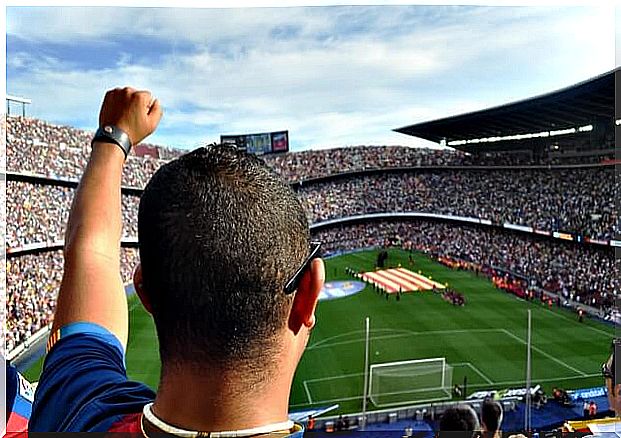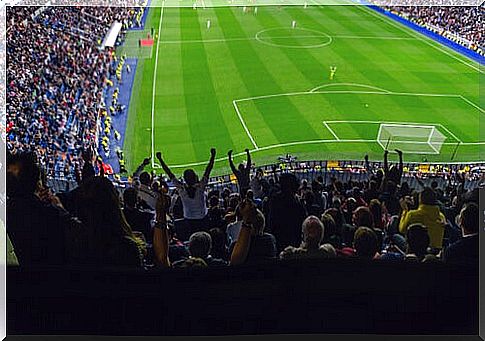Why Is There So Much Violence In Football?

Why is there so much violence in soccer? More specifically among the fans. Too often we see terrible events between rival supporters on the news. The last violent event was seen in the final of the Copa Libertadores that faced the Argentine teams River Plate and Boca Juniors.
As a result of the violence that was generated between various groups of fans, the final, instead of being played in Argentina, had to be played in Spain. Many people show their perplexity and amazement at this type of collective behavior and do not understand the reasons that cause it to occur.
However, psychology has been studying the social behavior of groups for many years, so in this article we will try to shed light on what is behind these violent and aggressive behaviors.
Violence in football from the deindividuation process
There is no single theory that brings together all the reasons that explain these facts, but there are theories that address them. In the first place, to explain violence in football we will address the process of deindividuation. This process does not explain violence in itself, but group behavior does.

Let’s imagine that we are watching a football match and a player from the opposing team is close to us. If we intend to insult him but are surrounded by fans of the opposing team, in all probability we will not do so. Now, what would happen if we were surrounded by fans of our same team?
If the fans around us are from the same team and their intentions are also to insult, in the end we will all end up verbally attacking the rival team’s player. What is the difference between the two situations? Anonymity and the responsibility.
As Moral, Gómez and Canto (2004) point out, “in these situations, anonymity, the group and reduced individual self-awareness would lead people to have uninhibited, impulsive and anti-normative behaviors” .
When we enjoy anonymity, we become more prone to violent actions. If no one knows that we are the ones who are insulting, we are more likely to do so than if we are the center of attention. On the other hand, being in a group, self-awareness decreases, that is, we transfer our responsibility to the group. We stop being us and we become the group, so what is usually thought is “not only insult me, but the group .”
Conformity process
Conformity is another process that could explain violence in soccer. This process consists of modifying the response of an individual bringing it closer to that expressed by a majority of people. That is, change our behavior to adapt it to that of the group.
As Paéz and Campos (2003) point out, “conformism is the change of beliefs or behaviors due to pressure from a group, which modifies the previous dispositions of the subject in the direction of the norm established by the group in question” .
In groups we can find several types of norms, among them: the descriptive norm, which refers to how one acts within the group. And the prescriptive rule, which refers to how it is expected to act. Conformity is a type of normative influence, since the individual is capable of changing his personal behavior to adapt it to that of the group. He is even capable of carrying out behaviors totally opposite to those that he would carry out individually.
Therefore, if our reference group behaves violently, it would not be strange for us to adopt that behavior. This conformism increases as the group’s levels of control over its members and the interdependence between them rise . It also increases when there is some uncertainty or ambiguity, that is, “when I don’t know what to do, I adopt the behavior of the group.”
Conformity increases when there is similarity between the group and the individual. If someone feels very identified with a soccer team and with the violent ideology of a group of fans, they will be more satisfied with carrying out violent behavior.

Final reflection
Violence in football is a reality that we experience too often. Excessive expectations in external stimuli causes us to deposit our happiness in events such as a soccer game.
If we have not received an adequate education and we are used to resolving differences through violence, it will not be difficult for us to act aggressively in the face of a disagreement. Therefore, a correct and respectful education with others is an important basis to avoid this type of behavior.
A rich inner world and an open and thoughtful mind will also add strength to ourselves and reduce our need to be part of a group. Behind this need, on many occasions there is a lack of self-esteem that we try to alleviate by belonging to a group.
The feeling of belonging gives us the feeling of emotional fullness, so the personal fulfillment that I have not developed inside, I look for it outside.
Learning, knowing yourself, will be essential to avoid falling into groups where violence is one of their maxims. Since the lower our self-esteem and the “stronger” the group, the more we will need to belong. So if we begin to respect ourselves and others, these kinds of events will be a thing of the past.









